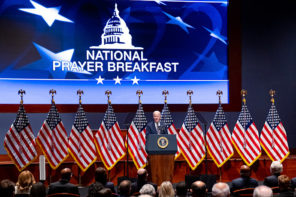In a decision that will eventually be seen as a major turning point in First Amendment law, the U.S. Supreme Court on Monday upheld an Arizona scheme to subsidize religious schools. By a 5-4 vote, the Court ruled that people who oppose these tax credits on principle have no standing to challenge it on Constitutional grounds.
This despite forty-three years of legal precedent during which the Court maintained that church-state separation issues are so important that concerned critics of religious establishment could challenge subsidized religion even though they experience no direct injury as a consequence of the subsidy.
The case—Arizona Christian School Tuition Organization v. Winn—grows out a clever ruse. The Arizona legislators who like Christian schools knew that they couldn’t just take the state’s tax money and hand it over directly—even the Roberts Court would frown on that. So they conspired with conservative Christian groups to create these intermediary tuition organizations. They then qualified the organizations to receive state tax credits. Oh, and by coincidence they allowed the organizations to discriminate in respect to the students and schools that would receive tuition assistance.
As the name of the court case indicates, we’re talking here about Christian schools teaching conservative Christian ideas. Let’s say that an Arizona taxpayer of my persuasion (we’ll call her Petra from Yuma) finds using the tax code to benefit such schools offensive to the First Amendment. In the past, Petra from Yuma could go into court to challenge the tax credit as a form of state-subsidized religion. But Petra (or a Thomas Jefferson redivivus, for that matter) is now out of luck.
The core issue is whether providing the tax credit has the exact same practical impact as simply giving tax revenues directly to religious education. It does, obviously. A child can see that it does. But Justice Kennedy, writing for the High Court majority, took a hard-line conservative “it’s your money” position in order to support the Arizona ruse. In a sentence that merits the Tortured Judicial Casuistry Award for 2011, Kennedy wrote: “Awarding some citizens a tax credit allows other citizens to retain control of their own funds in accordance with their own consciences.”
Um, let’s see. Is Petra from Yuma’s conscience now satisfied that other Arizona taxpayers, just not her and her friends, are obtaining favorable tax treatment from the state for advancing a religious cause? If I know Petra’s views as well as I think I do, I doubt that Justice Kennedy has won her over. Petra will argue that any tax subsidy for religion, in a closed system where the power to tax is limited, violates the non-establishment clause. Petra will also argue that the principle of taxpayer-supported universal public education is severely undercut if more and more taxpayers begin to get direct credits for supporting sectarian schools. Or rather, Petra would most likely make these arguments—but Petra is no longer allowed through the courthouse doors. She has lost her standing.
In a powerful dissent (her first since taking the bench), Justice Elena Kagan coolly demolished Kennedy’s casuistry. “Taxpayers experience the same injury,” she maintained, “whether government subsidization of religion takes the form of a cash grant or a tax measure.”
“Assume,” she wrote, that a given state wishes to “subsidize the ownership of crucifixes…It could purchase them in bulk and distribute them; it could reimburse buyers with a check; or it could pay with a tax credit. Now, really—do taxpayers have less reason to complain if the state selects the last of these three options?”
As is so often the case with the Roberts Court majority, they took a case that until now has been largely under the radar, decided it in a radical way that departs from both precedent and common sense, and then also “fixed” it in a way that will undermine the principle of church-state separation for decades to come. Because how many of us who support separation can claim to be directly injured as more and more states and school districts follow Arizona’s lead and devise indirect ways to prop up conservative religion?
I imagine the public could have gotten exercised if this case had involved state tax credits in support of a radical madrasa or a network of Wiccan schools. But this case merely involves upstanding American families wanting their kids to have a fine Christian education—so how bad can it be?
Plenty bad. Worst of all is the “wink wink” element involved, as the nation’s highest court now chooses to lend its imprimatur to a scheme that was explicitly hatched as a shameless end run around Mr. Jefferson’s Wall of Separation. Where is Original Intent now, you might ask? Then again, don’t bother.




